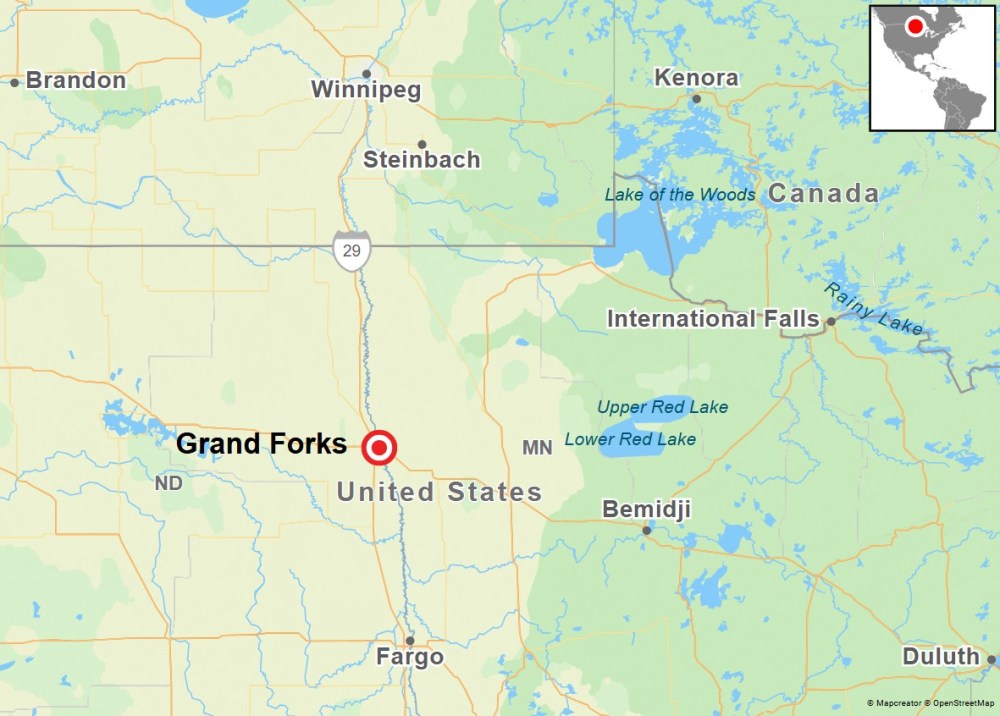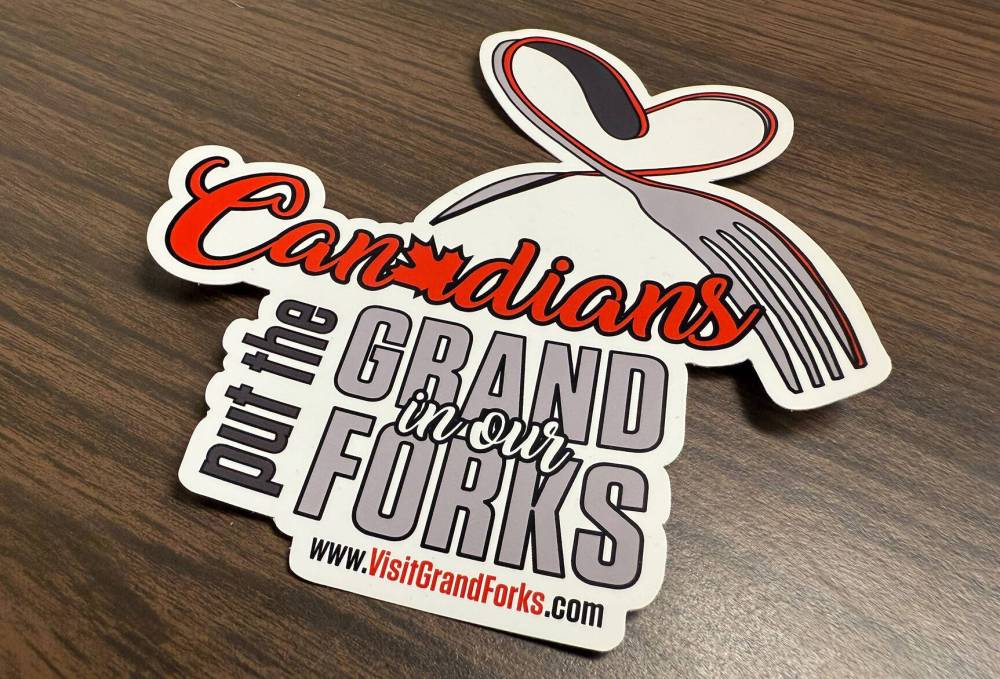Red state, cross-border blues Manitoba visitors are now an endangered species in Trump-supporting North Dakota; president's economic bullying and annexation threats have given us a reason to keep our loonies at home
Read this article for free:
or
Already have an account? Log in here »
To continue reading, please subscribe:
Monthly Digital Subscription
$1 per week for 24 weeks*
- Enjoy unlimited reading on winnipegfreepress.com
- Read the E-Edition, our digital replica newspaper
- Access News Break, our award-winning app
- Play interactive puzzles
*Billed as $4.00 plus GST every four weeks. After 24 weeks, price increases to the regular rate of $19.95 plus GST every four weeks. Offer available to new and qualified returning subscribers only. Cancel any time.
Monthly Digital Subscription
$4.99/week*
- Enjoy unlimited reading on winnipegfreepress.com
- Read the E-Edition, our digital replica newspaper
- Access News Break, our award-winning app
- Play interactive puzzles
*Billed as $19.95 plus GST every four weeks. Cancel any time.
To continue reading, please subscribe:
Add Free Press access to your Brandon Sun subscription for only an additional
$1 for the first 4 weeks*
*Your next subscription payment will increase by $1.00 and you will be charged $16.99 plus GST for four weeks. After four weeks, your payment will increase to $23.99 plus GST every four weeks.
Read unlimited articles for free today:
or
Already have an account? Log in here »
Hey there, time traveller!
This article was published 16/05/2025 (256 days ago), so information in it may no longer be current.
GRAND FORKS — A few kilometres north of this North Dakota city, a towering 15-metre-wide billboard along the I-29 highway stands out — especially if you’re Canadian.
It’s rented by the C’mon Inn, a well-known hotel along the city’s 32nd Avenue, nestled among the shops Manitobans have frequented for decades.
On this balmy Monday morning 235 kilometres south of Winnipeg, the hotel’s parking lot is quiet. The weekend crowd — if there had been one — has long since vanished. Whether there was a Canadian contingent at all depends on who you ask.
No one in charge at the hotel is willing to speak on the record to the Free Press, but whispers of a decline in Canadian clientele are hard to ignore.
So, too, are the statistics.
Titled the Canadian Political Climate Report, a six-page document compiled by Visit Greater Grand Forks — a tourism agency akin to Travel Manitoba — outlines what local hotels are experiencing.
Eighty-three per cent of those polled in a recent survey say they noticed a decrease in Canadian guests staying at their properties. Notably, not a single respondent indicated an increase.
Forty-five per cent feel it’s due to the current political climate, including annexation threats and tariffs imposed by U.S. President Donald Trump, who carried North Dakota with 67 per cent of the vote last November, including 57 per cent in Grand Forks County.
Feedback from hotels includes concerns ranging from exchange rates and tariffs to ‘waiting to see what Trump will do next’
While none of the surveyed hotels blamed the exchange rate directly — the Canadian dollar was trading at 71 cents that day — the remaining 55 per cent believed it was a mix of both politics and economics.
One thing most agreed on: the political tensions are impacting business. A striking 92 per cent of those surveyed felt the Canada-U.S. relationship is affecting bookings and triggering cancellations. Only eight per cent disagreed.
Feedback from hotels includes concerns ranging from exchange rates and tariffs to “waiting to see what Trump will do next.”
“I’ve had some email responses from past Canadian guests saying they loved our hotel but will not be visiting/staying again until our current president is not in office,” said one anonymous response.
Another put it bluntly: “The average Canadian seems to feel betrayed by recent changes. The overall sentiment seems to be (to) travel to the U.S. only when absolutely necessary.”
Pages 3-6 of the document contain email after email received by the agency from north of the border. Some are angry, some humorous and many are unmistakably disappointed.
They blame Trump and accuse the U.S. of treating Canada as the enemy. They speak fondly of previous quarterly visits. They ask to be removed from newsletter mailing lists. Some urge stern calls to the Oval Office.
Many are written in the past tense. “Staying, eating and shopping there was so much fun.”
Visit Greater Grand Forks has responded with a three-pronged approach.
It continues to manage an extensive digital advertising campaign in Manitoba, though social media ads have been suspended.
SCOTT BILLECK / FREE PRESS Visit Greater Grand Forks gave stickers to businesses to hang in their store windows, reminding Canadians that they ‘put the Grand in our Forks.’ 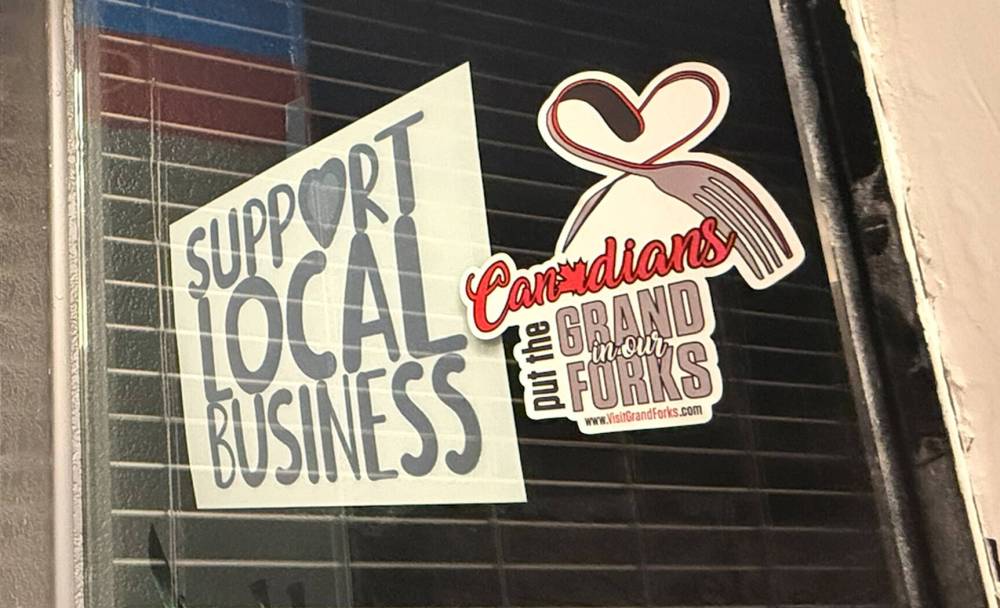
The agency distributed window decals that read, “Canadians put the Grand in our Forks.” Some businesses have posted them. Many others haven’t bothered.
And agency leadership has decided to decline media interview requests in Manitoba. (They also declined an in-person request.) That silence may explain why many of the hotels were also tight-lipped.
The Free Press obtained the political climate report from an employee at a major chain retail store, who was eager to sound the alarm.
Normally, the employee said, they’d be getting their store ready for the influx of Canadians flooding into town over the May long weekend.
This year, they’re not even bothering.
Emma Catka hasn’t had to stray far from her post behind the register at Ragstock, a Minneapolis-based retailer specializing in new and vintage clothing and accessories inside Columbia Mall.
The mall, once a bustling destination for shoppers from Manitoba, is now a shadow of its former self. Vacant storefronts outnumber those open for business and, by midday Monday, even some of the occupied shops had yet to open their doors.
Catka was willing to talk and empathized with Canadians.
“I’m one of the few that didn’t vote (for Trump),” she said. “I know some people are boycotting out of principle, out of morals. And I completely respect that. It’s a bummer, because we’re running a business. We’re not at risk of closing, by any means, but the Grand Forks community can tell there are not as many Canadians. You don’t know it until they’re not here.”
She added that the few Canadians still crossing the border don’t seem overly concerned about politics.
A scan of parking lots at major shopping hubs Monday — including Target, TJ Maxx, Hobby Lobby and Texas Roadhouse — turned up just a handful of Manitoba licence plates.
SCOTT BILLECK / FREE PRESS Parking lots lining Grand Forks’ 32nd Avenue were largely devoid of Manitoban license plates earlier this week.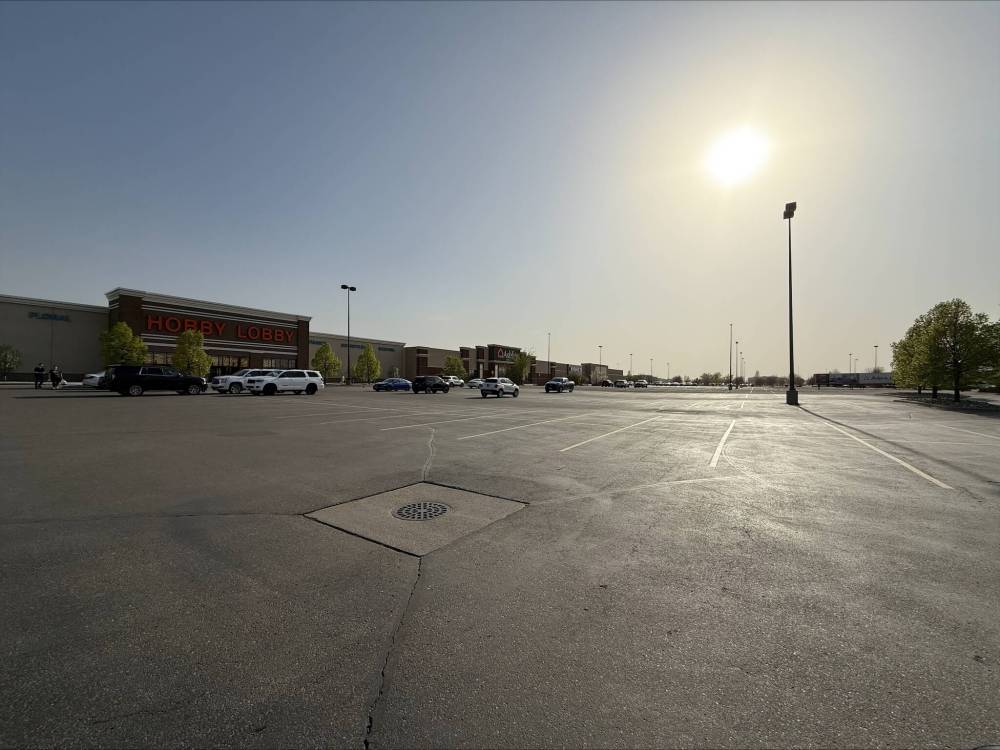
A worker at Hobby Lobby insisted Canadians are still coming down on weekends.
“Maybe it’s because we have something down here they don’t have up there,” she said.
Up the road at Happy Harry’s, that comment rings true.
Store managers at both locations declined formal interviews, but a Happy Harry’s cashier said Fridays and Saturdays tend to bring a steady flow of Manitobans eager to snag American liquor brands no longer sold at Manitoba Liquor Marts. The Wab Kinew government removed all American booze from Liquor Marts shelves in early March in response to Trump’s tariffs.
Back inside Columbia Mall, another store manager, speaking candidly on the condition of anonymity, was blunt about the impact.
“As soon as Trump took the presidency, we lost about 90 per cent of our Canadian traffic,” she said. “For this mall, that’s 30 per cent of our overall traffic. That’s a huge hit that we can’t make up. How do we create a new population to come in?”
At Grand Forks city hall, a framed University of North Dakota hockey jersey with the name “Bochenski” and the number 20 hangs on the wall in the mayor’s office.
Brandon Bochenski became the 27th mayor of Grand Forks in June 2020.
The 43-year-old former pro hockey player unseated incumbent Mike Brown, who occupied the office for two decades.
Bochenski was born in Blaine, Minn., about 500 kilometres southeast of Grand Forks. He played high school hockey with former Winnipeg Jets forward Matt Hendricks before becoming a star player at UND in the early 2000s, alongside future National Hockey Leaguers Zach Parise and former Jets forward Drew Stafford.
His collegiate success led to a seventh-round selection by the Ottawa Senators in the 2001 NHL Draft. Over his career, he played 156 NHL games for six teams, logged another 256 games in the American Hockey League and, eventually, spent eight seasons in Kazakhstan, captaining Barys Astana in the Kontinental Hockey League. There, he played with Winnipeggers Nigel Dawes and Dustin Boyd.
SCOTT BILLECK / FREE PRESS Grand Forks mayor Brandon Bochenski, a former NHLer with ties to Winnipeg, says his city misses Canadians, but admits there’s not much he can do to influence the current political situation.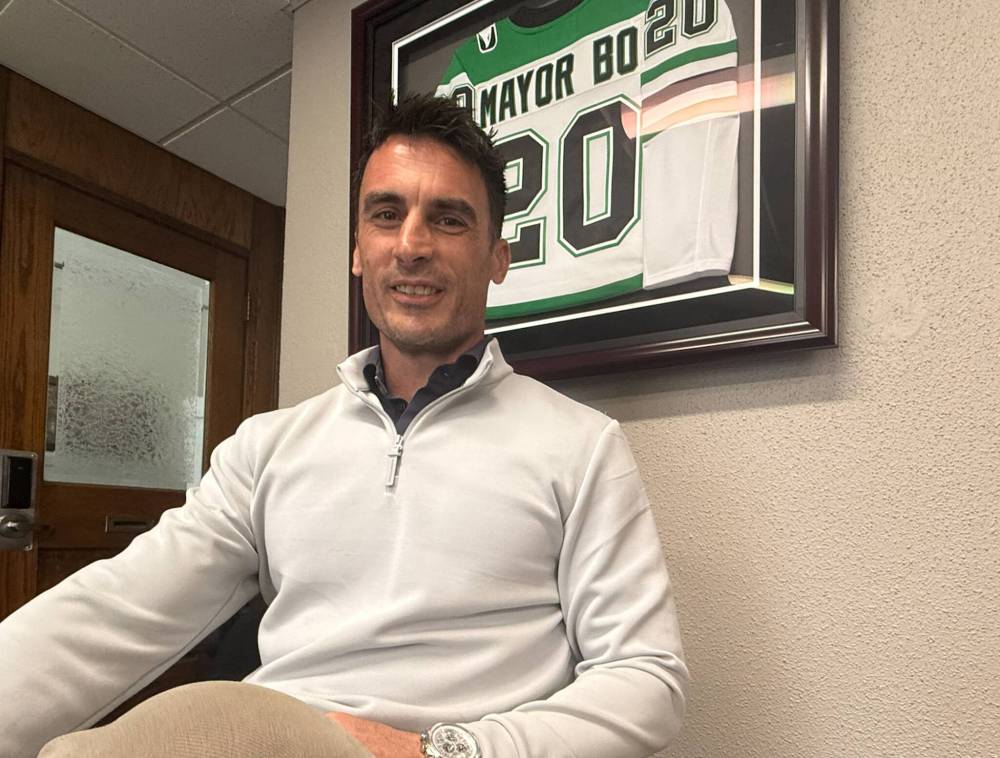
That time overseas — especially in Russia and Kazakhstan — along with his close ties to Canadian teammates and friends, has shaped his perspective as mayor at a time of political strife.
“I played in Russia for eight years and people always ask me, ‘What were the Russians like? Our countries hate each other,’” Bochenski said. “But it was perfectly normal. They were friendly. They were caring. We got together great. They weren’t mean to me.
“Of course, the governments have their conflicts, but as far as the day-to-day people, they were just normal people trying to get by, making life better for their families. It’s no different than the Canadians and Americans.”
The mayor has read the same emails expressing frustration sent to the city’s tourism office. He’s heard the calls to contact Trump.
“But we’re the 682nd largest city in the U.S.,” Bochenski said. “He doesn’t listen to his own advisers at times. I don’t know he’s going to listen to us.”
He also acknowledges North Dakota’s reputation as a conservative stronghold; it’s one of the most Republican-leaning states in the country.
“People want to tie (everyone) to that,” he said. “If you voted for that, it means that every decision they make, you endorse that. I don’t agree with that idea.”
Like its local businesses, the city has little choice but to weather the storm.
Bochenski noted that the decision to scale back Manitoba-targeted advertising came after earlier efforts backfired.
It’s hard to promote tourism, he said, when political messaging suggests Canadians aren’t welcome.
Still, he insisted the city’s friendly, welcoming attitude toward Canadians hasn’t changed.
“But if you’re following the messaging (from the Trump administration), it’s very protectionist,” he admitted. “It’s not traditional American values.”
Jody Thompson expected a record turnout of Canadian basketball teams in Grand Forks last month.
For decades, the Jr. Grand Am Basketball Tournament — North Dakota’s largest hoops event — has been a major draw for Manitoba-based club teams. Boys and girls from Grades 3-12 travel to compete against hundreds of teams from across the state, Minnesota and Canada.
Thompson, who runs the tournament, had anticipated up to 75 Canadian teams this year.
“We had done some target marketing in and around Winnipeg,” he said.
Instead, just 37 squads made the trip, a sharp decline from the 60 last year.
For Thompson, it meant a $6,000 loss in registration fees.
Downtown Grand Forks’ restaurants and bars.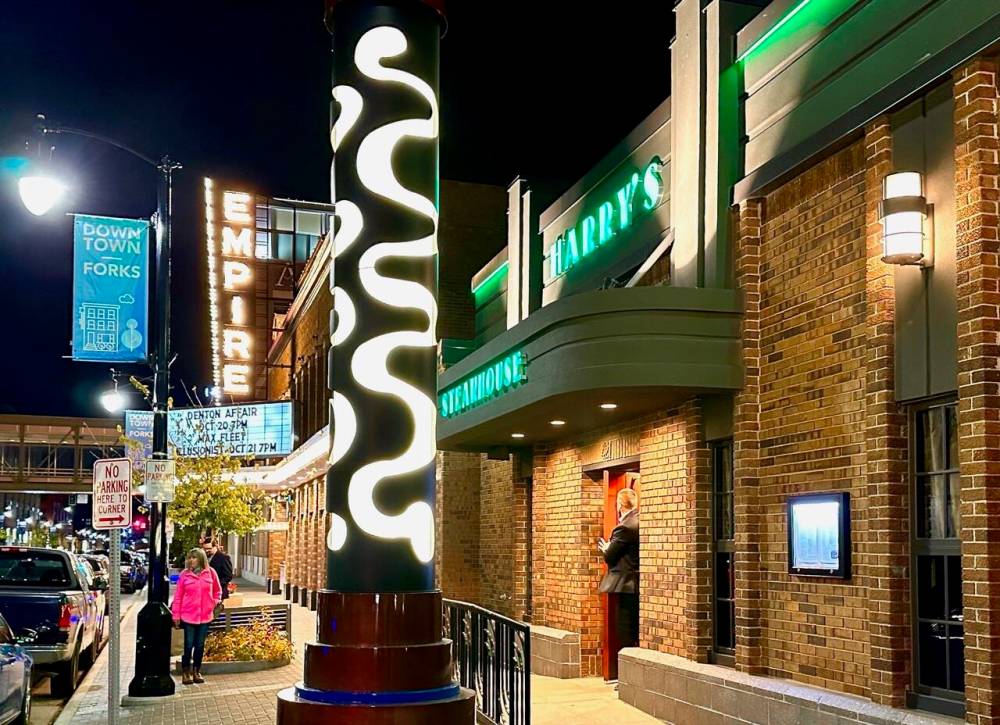
For the city, which realized $4.2 million in economic impact from the tournament in 2024, the financial sting was much deeper.
“Canadian teams bring lots of kids, lots of families,” he said. “They don’t drive back and forth, obviously. So they stay in our hotels and motels, spend money at our lodging places and gas stations. So the economic advantage of having a regular group of Canadian teams, we just didn’t have that this year.”
Teams that chose to stay home cited political tensions tied to Trump as a deciding factor.
“It was understandable and unfortunate,” Thompson said.
“We talked to some of the teams that did come, and they mentioned they did have conversations with their families about should they or shouldn’t they come. They ultimately decided to come for the kids’ experience of playing in the tournament.”
Thompson said he hopes the cross-border tensions settle down in time for next year’s tournament or, at the very least, that kids who missed out will urge their parents to return.
About 130 kilometres further south down I-29, Charley Johnson, the president and CEO of the Fargo-Moorhead Convention & Visitors Bureau, has fears that the fallout from the fractured political relations could be long-lasting.
The metro area straddling the North Dakota-Minnesota border, more than twice the size of greater Grand Forks at about 229,000 residents, has long been another favourite destination for Manitobans on its own, or as a halfway stop on the way to, or from, Minneapolis-St. Paul.
“It’s going to take a while to earn trust back, and we haven’t even started to try and earn it just yet,” Johnson said.
While tariffs ebb and flow, Johnson said it’s Trump’s repeated talk of annexation — the so-called 51st state rhetoric — that’s going to leave a scar.
“It seems to me that it’s the biggest burr under the saddles of Canadians,” he said. “In Canadians who have called me, they’ve been unfailingly polite, but they just seem hurt and angered by it. Hurt, more than anything.
“It’s going to take a while for people to trust us again.”
Johnson has closely followed data from the Emerson-Pembina port of entry. Crossings dropped about 4.5 per cent in January 2025 compared to the same month in 2024, but by March, the decline ballooned to 28.6 per cent.
’It’s going to take a while to earn trust back, and we haven’t even started to try and earn it just yet’ – Charley Johnson
March, typically a busy month for visits during Manitoba schools’ spring break, saw the sharpest drop yet. Vehicle passenger numbers fell from 49,651 in 2024 to 29,862 in 2025 — a near 40 per cent decrease.
Vehicle crossings — not taking account the number of people inside — fell 33 per cent, from 19,565 in March 2024 to 13,037 this year.
In Fargo, he said, there’s been a 12 per cent decline in hotel revenue and occupancy rates, something he anecdotally attributed to the dip in Canadian travellers.
Tana Sorenson, the regional director of operations for Hotel Equities, which has a corporate office in Fargo and runs more than 250 properties across North America, said there’s been a modest decline in Canadian bookings.
“Not enough where we’re panicking,” she said. “But we’re aware, to where we’re looking at what do we do in response.”
Sorenson said the company is taking a proactive approach, including attending Canadian trade shows and launching targeted digital ad campaigns, particularly on Facebook.
Digital ads may be working for some, but Johnson said he recently tried to buy time to run a radio ad on a Winnipeg radio station and was turned down.
“They wouldn’t take our money,” he said.
There’s no hero’s welcome waiting for Canadians at the Emerson-Pembina border crossing. Not yet, anyway. North Dakota hasn’t reached that level of desperation.
Instead, the ritual is subdued, even anticlimactic. A solitary stop at a vacant booth. A flash of the passport. A couple of perfunctory questions. Then you’re waved through, as quickly as you arrived.
Tales of phones being seized, interrogations about Trump or detainments for unflattering political opinions? None of them bore out.
The entire process took less than a minute — a breeze, quite literally, on a morning swept by prairie wind.
On the U.S. side, Pembina is a carbon copy of Emerson: quiet, empty, almost forgotten. The twin duty-free shops and their vacant parking lots, businesses stuck in a pandemic-like slumber.
The store manager on the American side declined to talk, but across the road at Gastrak, an employee summed it up with a shrug.
Like many who spoke, both on and off the record, there’s not much they can do but wait.
scott.billeck@freepress.mb.ca

Scott Billeck is a general assignment reporter for the Free Press. A Creative Communications graduate from Red River College, Scott has more than a decade’s worth of experience covering hockey, football and global pandemics. He joined the Free Press in 2024. Read more about Scott.
Every piece of reporting Scott produces is reviewed by an editing team before it is posted online or published in print — part of the Free Press‘s tradition, since 1872, of producing reliable independent journalism. Read more about Free Press’s history and mandate, and learn how our newsroom operates.
Our newsroom depends on a growing audience of readers to power our journalism. If you are not a paid reader, please consider becoming a subscriber.
Our newsroom depends on its audience of readers to power our journalism. Thank you for your support.

